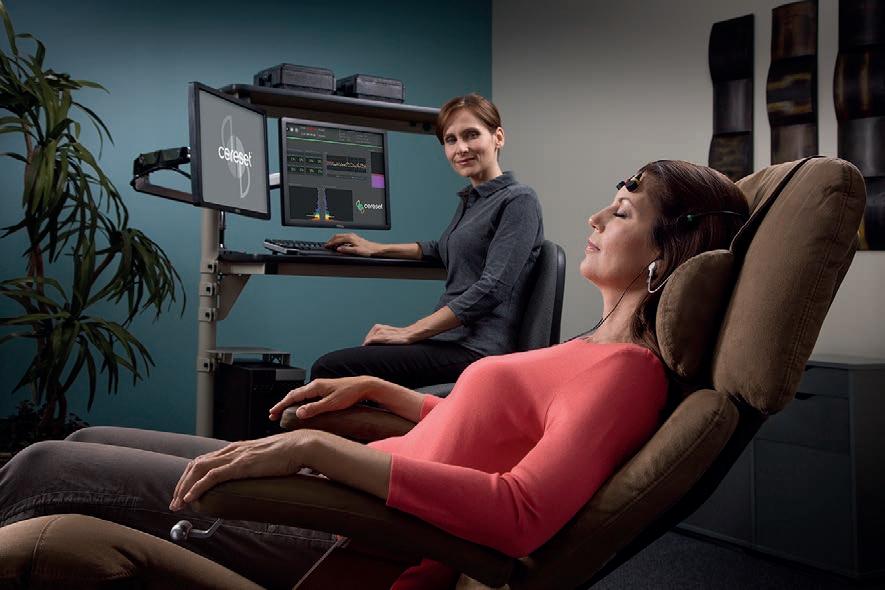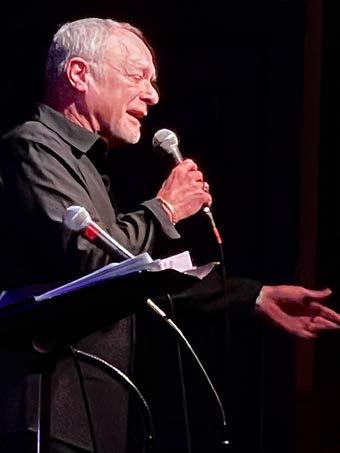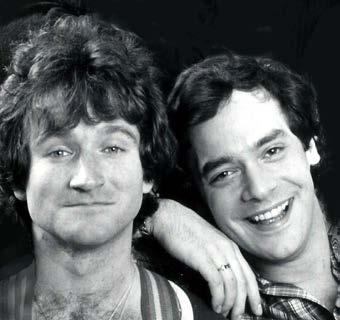
5 minute read
Wayne Powers
Jazz vocalist/actor/comedian/broadcaster Wayne Powers started as a nightclub singer in New York at age 16. He performed across the country, finally landing in Hollywood, where he worked for Henry Mancini. Powers launched his decades-long network television career after being discovered in a live improv comedy show with the then-unknown Robin Williams. Williams went on to “Mork & Mindy” and movies, while Powers went on to “Laverne & Shirley,” “Elvis and Me,” “One Day at a Time,” “Murder She Wrote,” “Simon & Simon,” “Full House,” “Alf,” “Doogie Howser,” and many others, including starring for two seasons in his own popular NBC sitcom, “13 East.”
Equally at home on television or the radio, in a theatre or club, or on a concert stage, music is his first love. Powers has played top jazz rooms and jazz festivals, consistently drawing large, enthusiastic, star-studded crowds.
Advertisement
Powers’ current concert performances, whether backed by a jazz quartet or a swingin’ big band, are centered in the Great American Songbook of jazz standards, swing tunes and saloon songs — and audiences are quite simply loving it. Several songs from Powers’ most recent album, “If Love Were All,” are currently featured on Sirius XM’s “Siriusly Sinatra” Channel.
Powers has known Michael Feinstein since 1977, when they performed together on stage in Hollywood. Don’t miss out on this extraordinary evening with Wayne Powers! Purchase your tickets at feinsteinshc.com.
Janelle Morrison: It’s an honor for us to have you perform at Feinstein’s at Hotel Carmichael!
Wayne Powers: I’m really looking forward to it! It’s a great venue and perfect for what I do and for sharing what I do with an audience.

JM: I feel like a second “jazz” renaissance is happening now. What is happening in our world and nation now is reminiscent of the 1920s through the 1940s. And I feel like there’s been a resurgence in the jazz genre and it’s making an impact similar to what it did for people in the Jazz Age. It was a time of social revolution and transformative change, during which this type of improvisational music and style of music was born.
WP: That’s exactly what’s happening, and that’s why I do what I do — to share this incredible genre of music that is very broad. Jazz is a large category of music that encompasses a lot of different cultures and is an amalgamation of all the influences of uniquely American music.
Jazz is very warm, even when it’s cool, and it’s very human. I think our culture has become less human and more digital, and what is happening [now] is a response to that. People are craving something that has heart and soul to it.
JM: Which came first: your passion for music or for acting? Or was it a passion for entertainment in general?
WP: I’ve always approached my acting as music and music as acting. As an actor, there is a rhythm, cadence and melody to speech. As a vocalist, I can’t just sing any song. I have to sing a song that I can get behind the lyrics on because I’m a storyteller. In my latest album, “If Love Were All,” there’s life and blood pulsing through every tune, and there’s passion in every lyric. It’s purposeful, and that’s what I do — I share the emotion, which comes through the music and in the lyrics.
I was an only child growing up. Like Robin Williams, who also grew up as an only child, I think we crave communication and connection with people as an only child. One way that I was always able to connect with people was to entertain them. My father was my idol growing up. He died in my arms in 1976. He was only 52 when he passed. He taught me a sense of humor, and he was always telling these terrible corny jokes, but he always made people laugh and he loved to sing. He had a beautiful voice … a great voice. On Sundays, he would play two singers, and he would sing along with them while he was doing whatever around the house. The two singers that he played all the time were Frank Sinatra and Nat King Cole. Being reflective, that was a huge influence on me.

JM: Is it true that you first met Michael Feinstein back in LA while working with the same improv comedy troupe that Robin Williams was also discovered in? WP: That is true. I moved to Los Angeles in 1976 and was working for Henry Mancini. But that’s not why I went to LA. I went to LA to perform and wound up falling into a job with Henry [Mancini], administering all of his music publishing. He gave me his old office on the corner of Sunset and Vine overlooking Wallichs Music City and the Hollywood sing. It was becoming a career, and I said, “Wait a minute, this is not why I came here. I came here to get into sitcoms and to perform my music.”
So, I got into this eight-member improv comedy group called “Off the Wall,” and we performed in a ballet studio on the second floor of this little building on Fairfax Avenue in Hollywood. We would hang curtains over the mirrors and dance bars and put up a little platform stage and folding chairs in this little studio and then sell tickets for five bucks. Robin Williams was a member of the group, and John Ritter and Betty Thomas [Hill Street Blues] would guest
[perform] with us. In the audience would be Norman Lear and Garry Marshall, and that’s how we all got discovered. Robin got “Mork & Mindy,” and I got “Laverne & Shirley.” It was a dynamic time and place.
There would be a musical interlude between the acts, and we had a piano player. And when we couldn’t get our regular [piano] player, we got Michael [Feinstein]. Michael was doing in California what Bobby Short was an icon for doing at Café Carlyle in New York City.
JM: Michael Feinstein is an extraordinary steward of the Great American Songbook, and his preservation efforts extend beyond these musical standards. Venues like Feinstein’s at Hotel Carmichael and the cabaret supper club concept would likely be extinct if it weren’t for his vision of a modern-day supper club venue and the efforts of the talent, such as yourself, performing at these venues that are drawing a wide demographic of ages and backgrounds.
WP: Michael had all of that passion and knowledge of the Great American
Songbook all those years ago. He was a visionary then, and he’s a visionary now in recreating the cabaret supper club environment, which was almost completely gone. And that’s the environment that I grew up in. He’s created a home where I feel at home, and that is Feinstein’s.
JM: What can your audience expect to see and hear when you come to perform in Carmel, Indiana?
WP: When I come to Carmel, I’m going to bring some of the greatest music ever written, in my opinion. I’ve got three great musicians from the Indianapolis area — a great trio. I will make you laugh a few times; I’ll bring some left turns … it’s not just going to be a string of songs. I call it my swing tunes and saloon song show. It celebrates both ends. If you’re sitting still [in your seat], you better take the cotton out of your ears! We’re going to give you an experience, and we’re going to share some of the joys and passions in my heart with you — musically. We’re going to have an evening together, and I really look forward to it.






